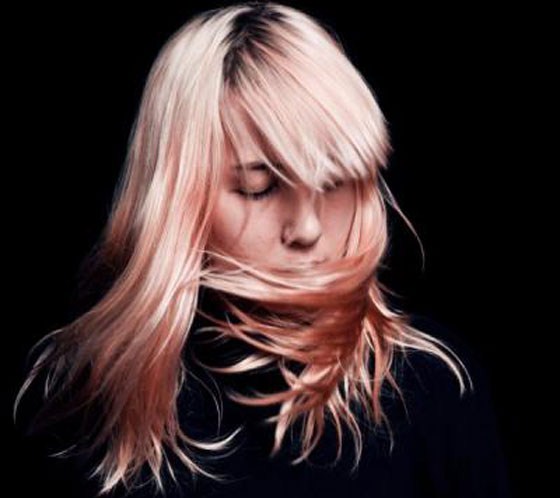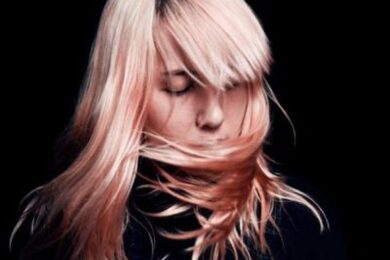"That was fun," says Katie Stelmanis as our interview winds to a close. I look for traces of sarcasm but her brown eyes are earnest. That’s curious. During our 35 minutes together she gave the impression of someone stoically tolerating a part of her job she’s not desperately keen to do.
This will not be the first time the singer of Toronto’s operatic dance trio Austra has been labelled cold. The classically trained 26-year-old’s vocal style has an icy edge that works in opposition to Maya Postepski (drums) and Dorian Wolf’s (bass) euphoric dance beats. By itself her voice sounds like a gothic Kate Bush or a ragged Zola Jesus. Adding Postepski, Wolf and a chunky synth has created a debut album that nods to the dancefloor while feeling strangely emotional at the same time.
Feel It Break might be Austra’s debut long-player, but is far from being Stelmanis’s first musical foray. Trained by the Canadian Children’s Opera aged 10, she spent 2005-2008 in the riot grrl-indebted band Galaxy and released a solo album Join Us in 2009. Along the way, she has appeared on Fucked Up’s 2008 album The Chemistry of Common Life.
We meet in Shoreditch’s The Book Club, a hipster venue bathed in midday sun and scattered with breakfast-seekers. Stelmanis, who is taking it easy in London between two tours, sips on a mint and lemon tea.
Your new album creates contrasting, almost contradictory moods. Your voice made me want to lie down and wait for the apocalypse, whereas the beats made me want to be in a car with the wind blowing through my hair. Was this musical contrast a deliberate effort on your part?
Katie Stelmanis: It’s more a reflection of the kind of music I write and listen to. I’ve always said my whole life that I don’t listen to music based on a genre; I listen to artists and musicians that I like, so it’s only natural that I write music that’s quite varied that’ll have a piano ballad in an electronic dance song.
You’ve mentioned Bjork, PJ Harvey and Nine Inch Nails as influences but do you listen to others who are doing what you’re doing and bringing those sounds together?
KS: For sure, I take a lot of influence from Owen Pallett. He makes music that cuts through the genres. I like and have always been influenced by The Knife because they brought dance music into the indie world. They were a big crossover band for a lot of people in the 90s and 00s who were listening to bands like Pavement and Death Cab for Cutie but not dance and techno.
Anyone who listens to your music is going to be struck by the power of your voice. Has the classical and operatic training you received from a young age set you up for life or do spend a lot of time doing vocal exercises to keep your voice in shape?
KS: I think it’s pretty much set me up for life. I studied opera for four years. I definitely cannot sing opera any more but I learned in that time how to sing. Singing is a full body experience. People ask me ‘Do you need to rest your voice?’ and I say ‘No, my singing is like my entire body’. Now that I know how to sing and where it all comes from, that’s ingrained in myself, and it’s going to be there forever.
So could you burst into song now, for example?
KS: Yes. I’m not going to. But I could…
There are some very ambiguous lyrics and song titles on the album. What does it mean to "shoot the water"?
KS: [Laughs] You know, my lyrics are incredibly ambiguous. I don’t ever write lyrics about literal things, and often the way I write lyrics is just through singing vocals and going with it. I’ll say a phrase and if I like the way it sounds I’ll sing it for other people, and they’ll have a completely different interpretation of what it means. And I kind of like that.
So do you see words as another note with the sound being more important than what they mean?
KS: Yeah, kind of. On my first recordings I didn’t write lyrics. It was just a lot of gibberish. Then I realised that people really like listening to lyrics. I never listen to lyrics. To me it’s 100 per cent about the vocal line and the melodies and it’s all about finding words that fit into that. I look for words that have a vowel that fit a particular line, rather than words that prompt you to think about what I’m saying.
You’ve said that you only seem able to write in a minor key. Is that to do with liking the way it sounds or to do with communicating a deeper feeling of melancholy?
KS: I have always been very drawn towards melancholic music. When I was in high school I was obsessed with listening to opera. I loved tragedies, I loved the drama of it. In my high school years I spent a lot of time listening to 20th century composers like Puccini and Debussy who mainly wrote in a minor key.
I’m always really curious with people who are drawn to melancholic themes, whether the interest is just for their art or whether it goes deeper and is reflective of their lives.
KS: I don’t really consider myself a very dark, melancholy sort of person, but I think that part of the reason I like this type of music is because listening to it creates a positive healing feeling. I don’t listen to that type of music and feel down. When I have moments of feeling really down I can’t even write.
When you had your first hit as a solo artist in 2009 with ‘Believe Me’ you were compared to female artists like Little Boots, Florence and the Machine and La Roux who came to the public attention at the same time. Are you happy in this company?
KS: Yeah, definitely. I was really happy when Florence came out because a woman with a similar voice to me was getting a lot of play on commercial radio. That was a good thing because it meant that my sound was going to become palatable. Before I felt that, compared to other bands, my voice can be abrasive. I’ve had people automatically say that they don’t like opera because they don’t like the sound of that voice.
But you’re doing something more complicated than most of those bands…
KS: Oh yeah! But it’s nice that at least one aspect of what I do has become palatable.
The atmospheric video – by Claire Edmondson – for your single ‘Beat And The Pulse’ is very focused on the female form. Why are there no male forms?
KS: The main reason there weren’t any guys was that none showed up to the shoot that day. We actually had intended for there to be men and women but it didn’t happen. It’s a reflection on my life, every person in the video is my friend and 99 per cent of my friends happen to be women. The video is a depiction of me and my friends in a room hanging out – we were kind of getting drunk and eating pizza. It doesn’t seem weird to me to be in a room with all women. I’m in rooms like that all the time.
We’ve heard that Clown from Slipknot recently sent you an admiring note. Is the note private or can you tell us what it said?
KS: I guess it’s a little bit private. It was really long and really sweet. He spoke of himself as being an artist and said that we connect on this level. It was a very deep and well-written…and from Slipknot! I was like, ‘Really?!’. I wouldn’t think of those guys as being like that. It was really, really sweet.
I guess don’t judge a band by their scary masks.
KS: Exactly. Definitely not.
When you were with Galaxy you identified as being a gay band. Is that something you are continuing to do with Austra or are you forging a new identity?
KS: I wouldn’t classify Austra as a gay band; I would classify us as a band that has gay people in it. I’m open and comfortable talking about that, but it seems weird to me that it’s such a focus point.
Finally, Austra, your middle name, is also the name of the Latvian goddess of light. Does this have any significance or is just your middle name?
KS: I didn’t realise that until a month ago but I think it’s interesting. I’m labelled as being such a dark artist, so I like that the meaning of Austra is the goddess of light.



